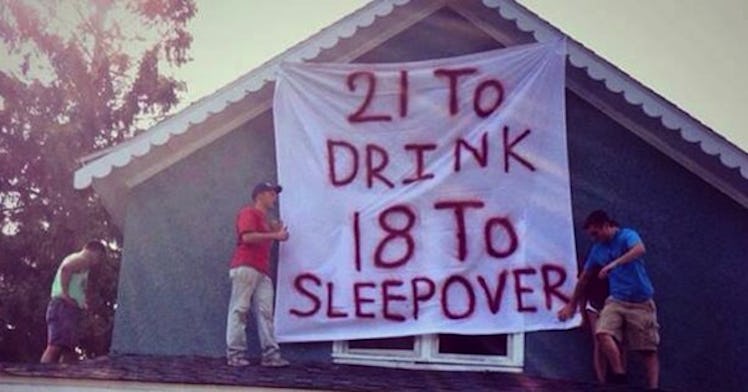National fraternity organizations and universities across the United States have held the media spotlight for repeated allegations regarding an ongoing sexual assault epidemic, one that President Obama called an “affront on our basic decency and humanity” in January 2014.
Fifteen months after Obama’s statement, on April 29, the Fraternity and Sorority Political Action Committee, known as FratPAC, and two other groups plan to bring scores of students to Capitol Hill with hopes of pushing legislation that will require the criminal justice system to resolve rape cases before universities can take official action.
In a February 2 conference call obtained by The Huffington Post, Buddy Cote, chairman of the North-American Interfraternity Conference, mentioned how colleges should defer punishment of an accused student “until the completion of the criminal investigation and any subsequent trial.”
Michael Greenberg, leader of 241-chapter Sigma Chi, has a similar disposition, saying, “If people commit criminal acts, they should be prosecuted, and they should go to jail.”
Some of the issues FratPAC is bringing forth to Congress include blocking colleges from suspending all fraternities on a campus due to a serious incident at a single house and ruling against mandates for Greek chapters to create a co-ed atmosphere.
While FratPAC, the North-American Interfraternity Conference and the National Panhellenic Conference attempt to regain public approval of the Greek system with what Kevin O’Neill, FratPAC’s executive director, considers to be their intention on becoming a “leader in offering ideas for how Congress can provide a safe campus for all students,” the US Department of Education is investigating 101 colleges for their handling of sexual assault cases.
A bipartisan group of senators, led by Sen. Kirsten Gillibrand (D-N.Y.) and Claire McCaskill (D-Mo.), are also pushing for stricter legislation on what colleges must do to address campus rape.
This legislation, titled the Campus Accountability and Safety Act (CASA), seeks to protect students and professionalize sexual assault reporting and response by establishing new campus resources and support services, boosting employee training standards, creating historic transparency requirements, establishing stiffer penalties for Clery Act violations and requiring a uniform discipline process and coordination with law enforcement.
In an interview with The Huffington Post regarding FratPAC’s lobby, Gillibrand said:
This proposal is completely backwards. We should be making universities more accountable for providing a safe campus, not less. Waiting for the long legal process to play itself out for those victims who pursue criminal charges while leaving potential serial rapists on campus for the interim would put public safety at risk.
Other opponents claim FratPAC’s legislation efforts are confusing campus civil rights proceedings with criminal investigations.
Lisa Maatz, a top lobbyist for the American Association of University Women, noted “campus proceedings are supposed to identify whether a student has violated the school’s policies, not the law.”
If the fraternity lobbyists do succeed, victim-advocates fear that criminal investigations and any subsequent trials could take years and may not even happen until after the victim and the offender graduate, which means that sexual assault victims and their abusers may continue to share the same campus space.
Looking into past instances confirm this fear. Take the 2011 alleged dorm room rape of Amherst College student Angie Epifano, who said college counselors questioned whether she was really raped, refused to allow her to change dorms and discouraged her from pressing charges. Epifano eventually withdrew from Amherst while her alleged rapist went on to graduate.
In Epifano’s case, the school’s lack of responsibility led to a complete dismissal of her claims.
According to the Rape, Abuse & Incest National Network (RAINN), “sexual assault is one of the most underreported crimes.”
A 2008 to 2012 "National Crime Victimization Survey" conducted by the Justice Department found that according to their data, out of every 100 rapes, 32 are reported to the police and only seven lead to an arrest.
Here’s one more statistic:
According to the US Department of Justice Bureau of Statistic in a December 2014 special report titled "Rape and Sexual Assault Among College-Age Females, 1995-2013," 80 percent of rape and sexual assault victimizations against female students were never reported to the police.
In this battle between the due process of law vs. a school’s ability to intervene on sexual assault cases, there are some crucial statements both sides stand behind, including:
1.) It is unproductive to carry on the stereotype that all fraternities are these dens of rape, violence and racism despite the continuity of national headlines.
2.) Victims of rape and sexual violence need their voices to be heard loud and clear, from an understanding and a sympathetic ear unwilling to judge.
The issue of campus rape and the startling 2014 White House report showcasing a horrifying prevalence of one in five women experiencing some form of sexual assault in college is an issue that should not, by any means, have two sides.
Why?
Because while FratPAC and associates seek the due process of law, an American standard, in alleged rape cases, the victims fall once again to the incompetent wayside of the American judicial system regarding the university experience and the rate of conviction for these crimes.
Not to mention the bias that exists with members of Congress who receive FratPAC donations and the hordes of powerful alumni.
There is no room for victim-blaming in rape cases. None. Nobody desires such terror, and there is no grey area of whether a victim was asking for it or not.
Yet, sexual assault victims repeatedly receive blame for these situations, and far too often are both the university system and law enforcement unsympathetic to the person who carries the sheer destructive weight of these travesties.
From violent acts of hazing, to chants of racism, to continual reports of rape and sexual abuse, many fraternities remain infamous as the proprietors of these heinous acts at campuses across the country.
Nonetheless, beginning on April 27 in Washington, FratPAC and other groups plan to push legislation to Congress that will, undoubtedly, make it more difficult for universities to investigate rape allegations.
